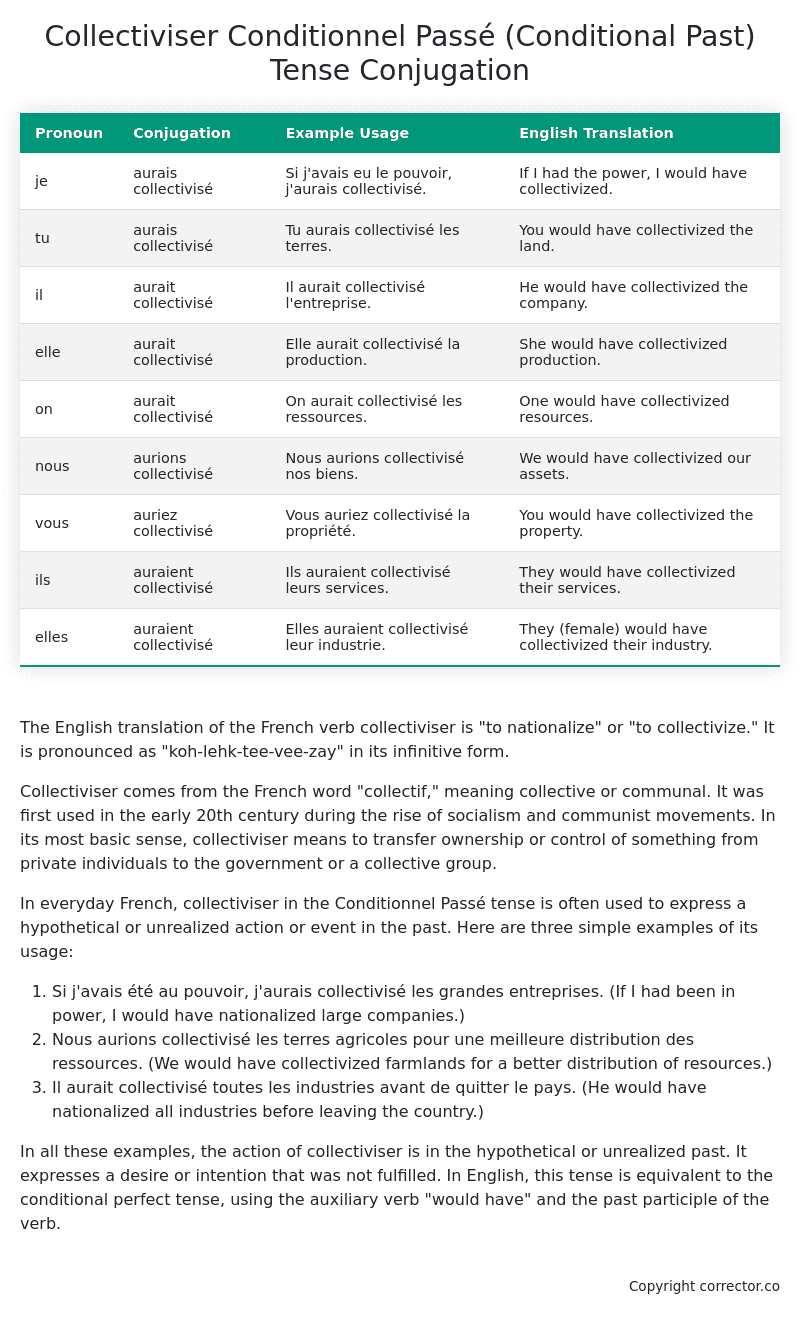Conditionnel Passé (Conditional Past) Tense Conjugation of the French Verb collectiviser
Introduction to the verb collectiviser
The English translation of the French verb collectiviser is “to nationalize” or “to collectivize.” It is pronounced as “koh-lehk-tee-vee-zay” in its infinitive form.
Collectiviser comes from the French word “collectif,” meaning collective or communal. It was first used in the early 20th century during the rise of socialism and communist movements. In its most basic sense, collectiviser means to transfer ownership or control of something from private individuals to the government or a collective group.
In everyday French, collectiviser in the Conditionnel Passé tense is often used to express a hypothetical or unrealized action or event in the past. Here are three simple examples of its usage:
- Si j’avais été au pouvoir, j’aurais collectivisé les grandes entreprises. (If I had been in power, I would have nationalized large companies.)
- Nous aurions collectivisé les terres agricoles pour une meilleure distribution des ressources. (We would have collectivized farmlands for a better distribution of resources.)
- Il aurait collectivisé toutes les industries avant de quitter le pays. (He would have nationalized all industries before leaving the country.)
In all these examples, the action of collectiviser is in the hypothetical or unrealized past. It expresses a desire or intention that was not fulfilled. In English, this tense is equivalent to the conditional perfect tense, using the auxiliary verb “would have” and the past participle of the verb.
Table of the Conditionnel Passé (Conditional Past) Tense Conjugation of collectiviser
| Pronoun | Conjugation | Example Usage | English Translation |
|---|---|---|---|
| je | aurais collectivisé | Si j’avais eu le pouvoir, j’aurais collectivisé. | If I had the power, I would have collectivized. |
| tu | aurais collectivisé | Tu aurais collectivisé les terres. | You would have collectivized the land. |
| il | aurait collectivisé | Il aurait collectivisé l’entreprise. | He would have collectivized the company. |
| elle | aurait collectivisé | Elle aurait collectivisé la production. | She would have collectivized production. |
| on | aurait collectivisé | On aurait collectivisé les ressources. | One would have collectivized resources. |
| nous | aurions collectivisé | Nous aurions collectivisé nos biens. | We would have collectivized our assets. |
| vous | auriez collectivisé | Vous auriez collectivisé la propriété. | You would have collectivized the property. |
| ils | auraient collectivisé | Ils auraient collectivisé leurs services. | They would have collectivized their services. |
| elles | auraient collectivisé | Elles auraient collectivisé leur industrie. | They (female) would have collectivized their industry. |
Other Conjugations for Collectiviser.
Le Present (Present Tense) Conjugation of the French Verb collectiviser
Imparfait (Imperfect) Tense Conjugation of the French Verb collectiviser
Passé Simple (Simple Past) Tense Conjugation of the French Verb collectiviser
Passé Composé (Present Perfect) Tense Conjugation of the French Verb collectiviser
Futur Simple (Simple Future) Tense Conjugation of the French Verb collectiviser
Futur Proche (Near Future) Tense Conjugation of the French Verb collectiviser
Plus-que-parfait (Pluperfect) Tense Conjugation of the French Verb collectiviser
Passé Antérieur (Past Anterior) Tense Conjugation of the French Verb collectiviser
Futur Antérieur (Future Anterior) Tense Conjugation of the French Verb collectiviser
Subjonctif Présent (Subjunctive Present) Tense Conjugation of the French Verb collectiviser
Subjonctif Passé (Subjunctive Past) Tense Conjugation of the French Verb collectiviser
Subjonctif Imparfait (Subjunctive Imperfect) Tense Conjugation of the French Verb collectiviser
Conditionnel Présent (Conditional Present) Tense Conjugation of the French Verb collectiviser
Conditionnel Passé (Conditional Past) Tense Conjugation of the French Verb collectiviser (this article)
L’impératif Présent (Imperative Present) Tense Conjugation of the French Verb collectiviser
L’infinitif Présent (Infinitive Present) Tense Conjugation of the French Verb collectiviser
Struggling with French verbs or the language in general? Why not use our free French Grammar Checker – no registration required!
Get a FREE Download Study Sheet of this Conjugation 🔥
Simply right click the image below, click “save image” and get your free reference for the collectiviser Conditionnel Passé tense conjugation!

Collectiviser – About the French Conditionnel Passé (Conditional Past) Tense
Formation
Common Everyday Usage Patterns
Expressing Unreal Past Scenarios
Polite Requests or Suggestions
Expressing Doubt or Uncertainty
Interactions with Other Tenses
Conditional Present
Indicative Past Tenses
Conditional Future
Summary
Want More?
I hope you enjoyed this article on the verb collectiviser. Still in a learning mood? Check out another TOTALLY random French verb conjugation!


